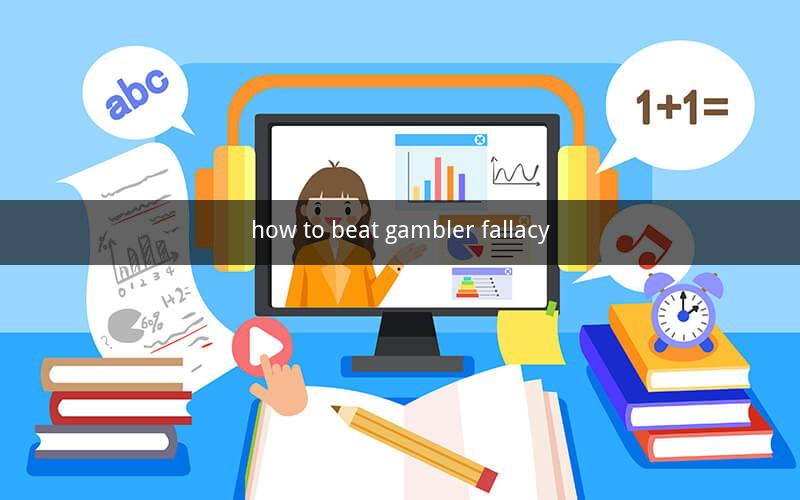
How to Beat the Gambler's Fallacy: Strategies for Rational Decision-Making
Table of Contents
1. Understanding the Gambler's Fallacy
2. The Psychological Roots of the Gambler's Fallacy
3. Recognizing the Gambler's Fallacy in Action
4. Strategies to Overcome the Gambler's Fallacy
- 4.1. Educate Yourself on Probability
- 4.2. Develop a Rational Mindset
- 4.3. Use Historical Data for Informed Decisions
- 4.4. Avoid Emotional Decision-Making
- 4.5. Set Clear Objectives and Stick to Them
5. Real-World Examples of the Gambler's Fallacy
6. Conclusion
1. Understanding the Gambler's Fallacy
The gambler's fallacy is a cognitive bias that leads individuals to believe that a random event is more or less likely to occur based on previous outcomes. This fallacy is particularly common in gambling, where players often believe that a particular outcome is due to the previous outcomes, even though each event is independent.
2. The Psychological Roots of the Gambler's Fallacy
The psychological roots of the gambler's fallacy are deeply rooted in our cognitive processes. Humans have a tendency to seek patterns and make predictions based on limited information. This tendency, combined with the desire to avoid uncertainty, can lead to the erroneous belief that recent outcomes influence future events.
3. Recognizing the Gambler's Fallacy in Action
Recognizing the gambler's fallacy is crucial for making rational decisions. Here are some common signs that you might be falling victim to this cognitive bias:
- Believing that a particular outcome is more likely after a series of similar outcomes.
- Making decisions based on a "hot hand" phenomenon, where you believe a player is on a winning streak.
- Overvaluing recent information and ignoring historical data.
4. Strategies to Overcome the Gambler's Fallacy
4.1. Educate Yourself on Probability
Understanding the basics of probability is essential for overcoming the gambler's fallacy. Probability is the likelihood of an event occurring, and it is independent of previous outcomes. By familiarizing yourself with probability concepts, you can make more informed decisions.
4.2. Develop a Rational Mindset
A rational mindset involves recognizing that each event is independent and that past outcomes do not influence future events. By adopting a rational approach, you can avoid falling victim to the gambler's fallacy.
4.3. Use Historical Data for Informed Decisions
Instead of relying on recent outcomes, use historical data to make informed decisions. By analyzing past performance, you can identify trends and patterns that may help you predict future outcomes more accurately.
4.4. Avoid Emotional Decision-Making
Emotional decision-making can cloud your judgment and lead to irrational choices. By remaining calm and objective, you can avoid the gambler's fallacy and make more rational decisions.
4.5. Set Clear Objectives and Stick to Them
Setting clear objectives and sticking to them can help you avoid making impulsive decisions based on the gambler's fallacy. By having a plan in place, you can make more deliberate and informed choices.
5. Real-World Examples of the Gambler's Fallacy
The gambler's fallacy is prevalent in various contexts, including gambling, sports betting, and financial markets. Here are a few examples:
- A roulette player bets on red after several consecutive black spins, believing that red is "due."
- A sports bettor continues to bet on a losing team, hoping that they will eventually win, despite the historical data indicating the team's poor performance.
- An investor sells a stock after it has been on a losing streak, assuming that the downward trend will continue.
6. Conclusion
The gambler's fallacy is a common cognitive bias that can lead to irrational decision-making. By understanding its roots, recognizing its signs, and adopting strategies to overcome it, you can make more rational and informed choices. Remember, each event is independent, and past outcomes do not influence future events.
Questions and Answers
1. Q: What is the gambler's fallacy?
A: The gambler's fallacy is the belief that a random event is more or less likely to occur based on previous outcomes, even though each event is independent.
2. Q: Why is the gambler's fallacy a problem?
A: The gambler's fallacy can lead to irrational decision-making, as it causes individuals to believe that past outcomes influence future events.
3. Q: How can I overcome the gambler's fallacy?
A: You can overcome the gambler's fallacy by educating yourself on probability, developing a rational mindset, using historical data, avoiding emotional decision-making, and setting clear objectives.
4. Q: Is the gambler's fallacy common in gambling?
A: Yes, the gambler's fallacy is particularly common in gambling, as players often believe that a particular outcome is more likely after a series of similar outcomes.
5. Q: Can the gambler's fallacy affect financial decisions?
A: Yes, the gambler's fallacy can affect financial decisions, as it may lead individuals to make irrational investments based on past performance.
6. Q: How can I avoid making decisions based on the gambler's fallacy?
A: You can avoid making decisions based on the gambler's fallacy by understanding the concept of probability, remaining calm and objective, and using historical data for informed decisions.
7. Q: Is the gambler's fallacy a sign of irrational behavior?
A: Yes, the gambler's fallacy is a sign of irrational behavior, as it leads individuals to believe that past outcomes influence future events.
8. Q: Can the gambler's fallacy be overcome through willpower alone?
A: While willpower can help, overcoming the gambler's fallacy often requires a combination of education, rational thinking, and disciplined decision-making.
9. Q: How can I teach others about the gambler's fallacy?
A: You can teach others about the gambler's fallacy by explaining the concept of probability, providing real-world examples, and encouraging critical thinking.
10. Q: Is the gambler's fallacy a permanent condition?
A: The gambler's fallacy is not a permanent condition. With education, practice, and awareness, individuals can learn to recognize and overcome this cognitive bias.